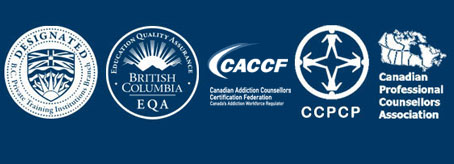Certificate In Applied Counselling Studies

Specializing In Youth & Family Counselling
Learning Objectives:
The course content for this area of specialization incorporates core counselling skills with knowledge and techniques specific to Youth and Family Counselling.
Diploma graduates or practicing counsellors enrolled in the Certificate specializing in Youth and Family Counselling will learn therapeutic skills to help children and adolescents develop a healthy sense of self in family, social relationships, and educational environments; identify and treat symptoms of psychological, cognitive and behavioral disorders that may manifest in acting out behaviors and delayed development; build a therapeutic relationship with youth and parents; develop and deliver psycho-educational programs AND counseling services for parents .
SCOPE of Practice
This definition of scope of practice for entry-level counsellors applies to the assessment and treatment of children and adolescents. The following protocol is recommended to determine whether or not the clinical issues presented by a child or adolescent fall within the entry-level counsellor’s scope of training.
- Conduct various bio-psycho-social assessments to determine areas of difficulty, history, patterns goal setting and appropriate referrals.
- Interview parents for a description of the youths’ behaviour and affect within the family unit, school environment and peer group.
- Obtain school records for an overview of general cognitive performance standards as measured by teachers’ comments and grades on the student’s report card.
For children and adolescents who present with mild to moderate difficulty functioning in one area of life (i.e., behavioural/affect concerns within the family, with peers, or in school) an entry-level counsellor may proceed to offer supportive counselling to the youth along with family and/or parenting counselling.
If one area of the youth’s life is marked with severe dysfunction, or if more than one area of the youth’s life is marked with moderate dysfunction, the counsellor is advised to seek immediate consultation with his/her supervisor regarding a possible referral to a physician, psychologist or social worker.
What you will learn
Opportunities will be provided for you to learn therapeutic skills to help children and adolescents develop a healthy sense of self in family and social relationships, and in their educational environment.
Upon graduation from this Certificate program, you may include the following skills as part of your Professional Portfolio:
- The ability to assess for and recognize symptoms of psychological, cognitive and behavioral disorders that may manifest in acting out behaviors of children and youth.
- The ability to assess for and recognize common indicators of delayed developmental tasks in children and youth.
- The ability to incorporate cultural sensitivity when counseling parents, children and adolescents.
- The ability to incorporate counseling skills such as trust building, advanced empathy, active listening, and play therapy when working with children.
- The ability to utilize techniques appropriate for adolescents such as trust building, empathetic listening, problem solving, art and music therapy.
- The ability to apply counseling techniques specific to various childhood disorders such as learning disabilities, anxiety disorders, and developmental disorders relating to damaged self-esteem, unresolved losses, and acting out behaviors and family conflicts.
- Proficiency with various parenting theories, and the ability to develop and deliver psycho-educational programs or counseling services for parents.
- The ability to counsel children, teens and their parents in a family setting using a variety of professional techniques such as: role plays, art and play, letter and journal writing, cognitive restructuring, conflict resolution, and behavior modification.
- Understanding the limits of confidentiality and legal implications when working with children and adolescents; when and how to report incidents of suspected abuse, and assess for suicidal risk and apply a “no-harm contract”.
- The ability to work within the limits of your scope of practice; the need for supervision and/or professional consultation; and how to make appropriate referrals.
Specialized Certificate in Youth and Family Counselling Required courses:
- Assessment of Psychological Disorders
- Abuse and Domestic Violence
- Collaborative Youth and Family Counselling
- Introduction to Couples’ Counselling
- Introduction to Applied Psychology & Ethics
- Milestones in Psychosocial Development
- Youth and Family Counselling I
- Youth and Family Counselling, II
- * Applied Counselling Skills I (ACS I-400 Case Mgmt., Assessment and Listening Skills)
*(experienced counsellors may substitute Multi-Cultural Competence)






